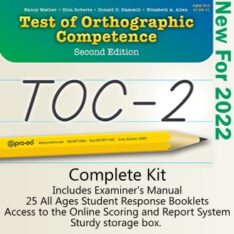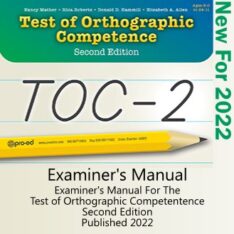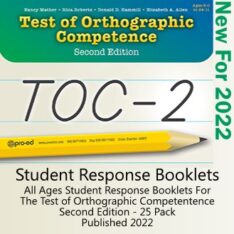Test of Orthographic Competence 2nd Edition (TOC-2)
Description
The Test of Orthographic Competence–Second Edition (TOC-2) assesses aspects of the English writing system that are integral to proficient reading and writing. These aspects include letters, spelling, punctuation, abbreviations, and special symbols. The TOC-2 now has a single form that can be administered to individuals or groups. Normed on a national representative sample of 1,512 individuals, it yields standard scores and percentiles for both subtests and composites. Classroom teachers, special education teachers, reading specialists, school psychologists, speech pathologists, or any other professionals with some training in standardized test administration can use the TOC-2.
Authors: Nancy Mather, Rhia Roberts, Donald D. Hammill, & Elizabeth A. Allen
Purpose: Assess orthographic processing
Ages: 8 – 24 years
Format: Paper and pencil
Published: 2022
Administration: Individual or group
Administration Time: 30-40 minutes
Qualification Level A
| Qualification Level: | A | Click For More Qualification Level Information |
Subtests
The Test of Orthographic Competence 2nd Edition (TOC-2) has six subtests:
- 1. Punctuation. The student is given a list of printed sentences that contain no punctuation except for spacing between the words (e.g., where is edward b brown). The task is for the student to supply the missing punctuation by editing the sentence.
- 2. Abbreviations. The student is given a list of printed abbreviations (e.g., 4:00, Dr., USA) and is asked to write what each abbreviation means.
- 3. Sight Spelling. The examiner says a word and the student is shown part of the word where one or more of the letters is missing (e.g., the examiner says the word know and the student sees “ __ow”.) The student is asked to fill in the missing letter or letters (which include an irregular or unusual orthographic element) to complete the spelling of the word.
- 4. Homophone Spelling. The examiner says a word (e.g., oar) and the student is shown a picture (e.g., a picture of a boat oar) and the student is asked to provide the correct spelling of the homophone that is represented by the picture (i.e., the student must write the word “oar”).
- 5. Word Scramble. The student is shown sets of scrambled letters that can be rearranged to spell real words (e.g., the letters nra can be rearranged to spell the word ran). The student has three minutes to re-order as many groups of letters into words as possible.
- 6. Letter Choice. The student is shown rows of words where one of four letters (p, d, b, or q) is missing from the word (e.g., _etter where the letter b is missing from the word or sai_ where the letter d is missing from the word). The student is given two minutes to write in the correct letters that will make each one into a real word.
Composites
The TOC-2 has five composites:
- 1. Orthographic Knowledge (OK) This composite is formed by combining the scaled scores from all six of the subtests: Punctuation, Abbreviations, Sight Spelling, Homophone Spelling, Word Scramble, and Letter Choice. It is the best estimate of a student’s overall orthographic knowledge because it is the most reliable and valid score on the TOC-2.
- 2. Conventions (CO). This composite is formed by combining the scaled scores from the Punctuation and Abbreviations subtests. This composite represents the non-spelling (and sometimes not even alphabetic) aspects of the English writing system that are important to meaningful reading and writing.
- 3. Spelling Accuracy (SA). This composite is formed by combining the scaled scores from the Sight Spelling and the Homophone Spelling subtests. This composite represents a student’s ability to accurately spell the irregular element of words and produce the correct spelling for a word that is a homophone.
- 4. Spelling Fluency (SF). This composite is formed by combining the scaled scores from the Word Scramble and the Letter Choice subtests, both timed tests. This composite represents a student’s accuracy as well as speed of processing and recalling letter strings and spelling patterns. Spelling Fluency can be compared to the Spelling Accuracy composite to determine whether a student has developed accurate orthographic images but does not process these visual images quickly or automatically.
- 5. Spelling Efficiency (SE). This composite is formed by combining the four spelling tests: Sight Spelling, Homophone Spelling, Word Scramble, and Letter Choice. This composite represents both a student’s accuracy and speed of processing and recalling letter strings and spelling patterns, and is useful as an estimate of orthographic processing.
Online Scoring
Access to the new TOC-2 Online Scoring and Report System is now included with the purchase of each TOC-2 Complete Kit and with the purchase of every replacement pack of Student Response Booklets. The TOC-2 Online Scoring and Report System yields four types of normative scores: age and grade equivalents, percentile ranks, subtest scaled scores, and composite index scores. Percentiles provide the examiner with an index that is easily understood by parents and other with whom the test results are to be shared. Subtest scaled scores are based on a distribution having a mean of 10 and a standard deviation of 3. Composite indexes are based on a distribution having a mean of 100 and a standard deviation of 15. Age and grade equivalents are indexes of relative standing that translate subtest raw scores into orthographic ability ages.
| Test of Orthographic Competence Second Edition (TOC-2) Materials and Pricing | ||
| TOC2-KIT | Test of Orthographic Competence, Second Edition (TOC-2) Complete Kit | $239.00 |
| TOC-2 Kit includes Examiner's Manual, 25 Student Response Booklets (All Ages), and access to the Online Scoring and Report System, all in a sturdy storage box. | ||
| TOC2-MAN | TOC-2 Examiner’s Manual | $132.00 |
| TOC2-SRB | TOC-2 Student Response Booklets (All Ages) | $98.00 |



